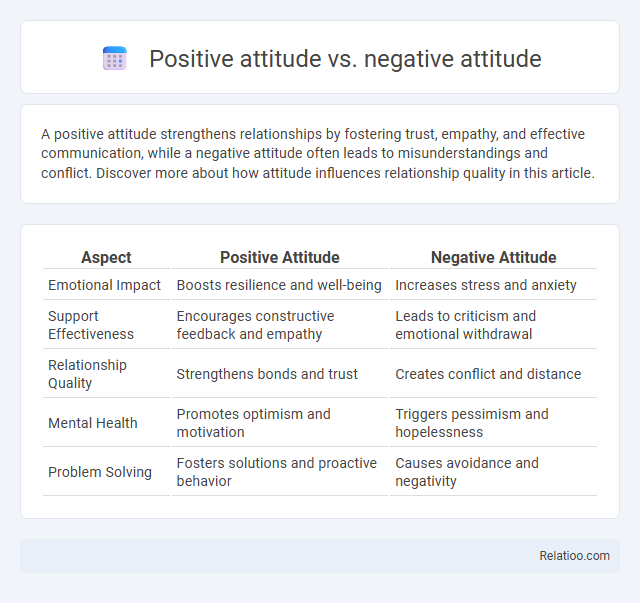A positive attitude strengthens relationships by fostering trust, empathy, and effective communication, while a negative attitude often leads to misunderstandings and conflict. Discover more about how attitude influences relationship quality in this article.
Table of Comparison
| Aspect | Positive Attitude | Negative Attitude |
|---|---|---|
| Emotional Impact | Boosts resilience and well-being | Increases stress and anxiety |
| Support Effectiveness | Encourages constructive feedback and empathy | Leads to criticism and emotional withdrawal |
| Relationship Quality | Strengthens bonds and trust | Creates conflict and distance |
| Mental Health | Promotes optimism and motivation | Triggers pessimism and hopelessness |
| Problem Solving | Fosters solutions and proactive behavior | Causes avoidance and negativity |
Understanding Positive and Negative Attitudes
Positive attitude involves optimism and confidence that enhance problem-solving and resilience, leading to improved mental health and social interactions. Negative attitude, characterized by pessimism and doubt, often results in stress, decreased motivation, and strained relationships. Understanding these attitudes aids in identifying behavioral patterns and implementing strategies to foster positivity for personal growth and well-being.
The Psychology Behind Attitudes
The psychology behind attitudes reveals that your mindset significantly impacts mental health and behavior patterns. Positive attitudes are linked to increased resilience, improved problem-solving, and greater life satisfaction, while negative attitudes often correlate with stress, anxiety, and reduced motivation. Understanding the cognitive and emotional components of attitudes helps you consciously shape perceptions for healthier interpersonal interactions and personal growth.
Key Traits of a Positive Attitude
Positive attitude key traits include optimism, resilience, and proactive problem-solving, fostering better mental health and interpersonal relationships. Negative attitude often involves pessimism, self-doubt, and resistance to change, which can hinder personal growth and success. Developing a positive attitude enhances motivation and productivity, serving as a foundation for achieving goals and overcoming challenges.
Common Signs of a Negative Attitude
A negative attitude often manifests through common signs such as constant complaining, resistance to change, and persistent pessimism. Individuals displaying a negative attitude may frequently blame others, show a lack of motivation, and demonstrate poor communication skills. Understanding these behaviors is crucial for addressing and transforming attitudes into positive, productive mindsets.
Impact of Attitude on Mental Health
A positive attitude significantly enhances mental health by reducing stress, promoting resilience, and increasing overall well-being, while a negative attitude often contributes to anxiety, depression, and cognitive distortions. Attitude shapes how individuals interpret experiences and cope with challenges, directly influencing psychological outcomes and emotional regulation. Cultivating a positive mindset is essential for improving mental health and fostering adaptive coping mechanisms.
Positive Attitude and Workplace Success
A positive attitude significantly influences workplace success by enhancing problem-solving abilities, boosting team collaboration, and increasing resilience to stress. Your proactive mindset fosters a productive environment, encouraging motivation and innovation among colleagues. Unlike negative attitudes that hinder growth, cultivating positivity drives career advancement and overall job satisfaction.
Negative Attitude and Relationship Challenges
Negative attitude significantly impacts relationship challenges, increasing conflicts and reducing empathy between partners. Your interactions become strained as negativity fosters communication barriers and undermines trust, often leading to misunderstandings and emotional distance. Cultivating a positive attitude helps counteract these issues by enhancing emotional resilience and promoting healthier, more supportive connections.
Strategies to Cultivate a Positive Attitude
Cultivating a positive attitude involves consistent strategies such as practicing gratitude, engaging in positive self-talk, and surrounding oneself with supportive influences that reinforce optimistic perspectives. Negative attitudes often stem from cognitive distortions and limiting beliefs, which can be transformed by mindful awareness and reframing thoughts to emphasize possibilities rather than obstacles. Developing a positive attitude enhances resilience, improves mental health, and fosters productive relationships, making it a crucial element for personal and professional growth.
Overcoming Negative Attitude Patterns
Overcoming negative attitude patterns requires recognizing cognitive distortions and actively replacing them with positive thought frameworks to boost resilience and emotional well-being. Developing a positive attitude involves cultivating optimism, gratitude, and solution-oriented thinking, which enhances motivation and interpersonal relationships. Attitude significantly shapes behavior and outcomes by influencing perception, decision-making, and stress management in both personal and professional contexts.
Long-Term Benefits of Embracing Positivity
Positive attitude enhances mental resilience and fosters productive relationships, leading to sustained personal and professional growth over time. Negative attitude often limits opportunities by creating stress and reducing motivation, adversely affecting long-term success and well-being. Embracing positivity cultivates a mindset that attracts continuous learning, health benefits, and improved decision-making critical for achieving enduring life satisfaction.

Infographic: Positive attitude vs Negative attitude
 relatioo.com
relatioo.com